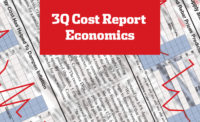Likewise, Park Ridge, N.J.-based Hertz Equipment Rental Corp. doubled second-quarter profits with a 10.5% revenue growth of $301.7 million. Sunbelt Rentals, Fort Mill, S.C., showed a 10% revenue gain to $1.08 billion. RSC Equipment Rental is also seeing a jump in business, with $367 million in second- quarter revenue, or 22% more than a year ago.
“Companies hire temporary workers before hiring full-time employees. Contractors similarly will rent equipment before buying,” says Adam Fleck, an associate research director with investment research firm Morningstar Inc., Chicago. “But contractors can only go so long before they need to replace fleets.”
Fueled in part by rising commodity costs, new equipment prices climbed a year-over-year 4.2% in August, according to the Producer Price Index, rising considerably higher than the 1% or less growth seen during the last few years. Used-equipment values grew 10.4% in the first half of 2011, according to Rouse Asset Services, Beverly Hills, Calif. The top construction machinery categories that gained value over that period were scissor lifts (23.4%), telescopic booms (22.4%) wheel loaders (19.8%) and high-reach forklifts (14.9%).
“Used-equipment values continue to trend upward—a leading indicator for new equipment demand,” Ann Duignan, an analyst with J.P Morgan, New York City, said in a recent investor note. “The data continues to show that a replacement cycle is under way.”
Fleet owners are worried about buying today's Tier IV Interim machines before Tier IV Final emission standards hit in 2014. However, they should be able to off-load older units to less-regulated countries, says analyst Lawrence De Maria, who co-heads Chicago-based William Blair & Co.'s global industrial infrastructure group. Even so, some used machines may need to be modified to work in places lacking high-quality diesel or liquid urea for selective-catalytic reduction, diminishing their price competitiveness.
Emerging suppliers looking to sell new machines in this country have a similar problem. “Many of the exporters are able to meet the latest emissions,” replies David Phillips, the managing director of Off-Highway Research, London, in a recent e-mail exchange. “But doing so increases their costs and erodes their low-price advantage.”

.jpg?height=200&t=1640294757&width=200)

Post a comment to this article
Report Abusive Comment